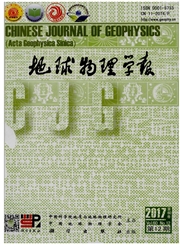

 中文摘要:
中文摘要:
共性误差是区域连续GPS网络中存在的一种与时空相关的主要误差源.对区域网络使用空间滤波能够有效减小这种误差并改善坐标时间序列的精度.本文使用GAMIT/GLOBK 10.5软件解算南极半岛区域11个GPS测站2010—2014的数据,各测站独立估计的单天解组成坐标时间序列.利用堆栈法(stacking)、主分量分析法(principal component analysis,简称PCA)和Karhunen-Loeve展开法(KLE)对其进行空间滤波,在利用PCA和KLE方法进行空间滤波时,使用前两个主分量作为共有模式分量.结果表明:三种方法均能有效提取南极半岛区域共性误差,PCA方法的滤波效果明显优于stacking方法,略微优于KLE方法;空间滤波能够有效减小残差时间序列的振幅、功率和RMS;对坐标时间序列进行空间滤波能够有效降低其线性项和周期项误差,从而提高线性项和周期项估计的精度.共性误差的谱分析结果显示在U方向上存在9.4天、13.7天等短周期的信号,推测共性误差组成成分中可能含有与海潮相关的误差源.
 英文摘要:
英文摘要:
The spatially and temporally correlated common mode errors (CME) are the dominant error sources in daily GPS solutions in the regional CGPS network. Spatial filtering is an effective way to improve the precision of coordinate time series for regional CGPS networks by reducing these errors. The data of 11 GPS stations from 2010 to 2014 in Antarctic Peninsula are processed with GAMIT/GLOBK10.5 software. The set of individually estimated daily positions then make up the position time series for every stations. Three filtering approaches including stacking, principal component analysis (PCA) and Karhunen-Loeve expansion (KLE) were applied to daily coordinate time series of Antarctic Peninsula GPS network from 2010 to 2014. The first two principal components in PCA and KLE were used as common modes. The filtering results show that all of the three methods can effectively extract the common mode errors in the Antarctic Peninsula, but the results of PCA are much better than those of stacking, and slightly better than those of KLE. We demonstrate that spatial filtering can effectively reduce the amplitude and power of the residual time series and effectively reduce the errors of linear term and periodic term in coordinate time series, so as to improve the accuracy of their estimations. The spectrum results of common mode errors from PCA analysis show that 9.4-day and 13.7-day period signals in the vertical component might be related to the ocean tide model used in the analysis.
 同期刊论文项目
同期刊论文项目
 同项目期刊论文
同项目期刊论文
 Comparison analysis on the 150*150 lunar gravity field models by gravity/topography admittance, corr
Comparison analysis on the 150*150 lunar gravity field models by gravity/topography admittance, corr Lunar geophysical parameters inversion based on gravity/topography admittance and particle swarm opt
Lunar geophysical parameters inversion based on gravity/topography admittance and particle swarm opt 期刊信息
期刊信息
